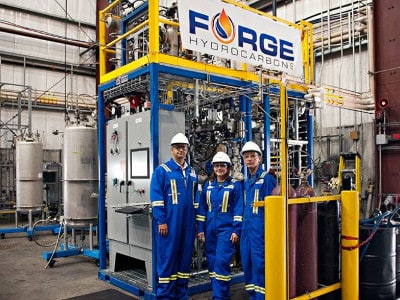
 Edmonton, Alberta’s Forge Hydrocarbons Inc., a biofuel company that turns animal fats and cooking grease into fuel, has received a $4.2 million grant from federal government agency Sustainable Development Technology Canada.
Edmonton, Alberta’s Forge Hydrocarbons Inc., a biofuel company that turns animal fats and cooking grease into fuel, has received a $4.2 million grant from federal government agency Sustainable Development Technology Canada.
University of Alberta bioresource scientist David Bressler was hired in 2003 in a cross appointment with Alberta Agriculture, after which he eventually founded the Biorefining Conversions Network in 2009.
“It’s a huge validation,” said Bressler of the SDTC investment. “It’s capital investment. It’s not a research project anymore.”
Forge Hydrocarbons is a University of Alberta spin-off company in which Bressler is a partner and lead scientific advisor.
Bressler made the initial discovery leading to the patented Forge Hydrocarbon process thanks to a $4.9 million NSERC Discovery grant.
Bressler has figured out how to use comparatively dirtier source material than previous biofuel processes, and to produce the biofuel using high-temperature chemistry, without the need for expensive catalytic additives or high-quality source materials.
Most biofuel processes have been limited until now by the relatively costly need to add hydrogen and mineral catalysts in order to separate oxygen from the biofuel’s raw material, which typically needed to be a clean feed stock, like pricier canola, which can be had for 30 cents per pound, as opposed to grease and cooking oil, which can be found for 15 to 20 cents per pound.
The result is a process that can use much cheaper and dirtier materials that will produce a “drop in” biofuel, or one that’s chemically indistinguishable from petroleum-based fuel.
“We can use really dirty fuels like brown grease (used cooking oil), and tall oils, which are the oils from trees when they separate out the pulp,” said Bressler. “And because the (production) plant doesn’t need a catalyst, the plants are cheaper to build. Instead of having one big plant, we can have five smaller ones in various areas, contributing to economic development in those communities.”
Ethanol, still the most widely used biofuel, typically has to be blended with petroleum-based diesel, something else that Forge Hydrocarbons has done away with.
Forge’s process sees animal fats or grease heated with water at a high temperature, creating fatty acids and glycerol, after which the fatty acids are heated at more than 400 degrees Celsius, until the oxygen is released.
The result is hydrocarbons, which can then be processed to make a variety of fuels, including gasoline.
The grant means that Forge can create a $12.7 million commercial production plant, which it hopes will be under construction in 2017, eventually producing 19 million litres of liquid renewable hydrocarbons each year.
Their market will be oil and gas companies, who are required to use a certain amount of renewable content.
Until now, Forge has been producing 200,000 litres annually at its pilot plant in northeast Edmonton, funded by Western Economic Development Canada and the Alberta Livestock and Meat Agency.
Leave a Reply
You must be logged in to post a comment.




 Share
Share Tweet
Tweet Share
Share




Comment